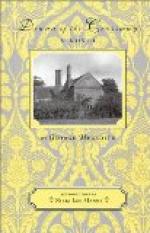‘It depends, as elsewhere, on the individuals entertaining us.’
’Yet you admit that your railways are rapidly “polishing off” the individual.’
‘They will spread the metropolitan idea of comfort.’
’I fear they will feed us on nothing but that big word. It booms—a curfew bell—for every poor little light that we would read by.’
Seeing their beacon-nosed postillion preparing too mount and failing in his jump, Redworth was apprehensive, and questioned the fellow concerning potation.
’Lord, sir, they call me half a horse, but I can’t ‘bids water,’ was the reply, with the assurance that he had not ‘taken a pailful.’
Habit enabled him to gain his seat.
’It seems to us unnecessary to heap on coal when the chimney is afire; but he may know the proper course,’ Diana said, convulsing Danvers; and there was discernibly to Redworth, under the influence of her phrases, a likeness of the flaming ‘half-horse,’ with the animals all smoking in the frost, to a railway engine. ‘Your wrinkled centaur,’ she named the man. Of course he had to play second to her, and not unwillingly; but he reflected passingly on the instinctive push of her rich and sparkling voluble fancy to the initiative, which women do not like in a woman, and men prefer to distantly admire. English women and men feel toward the quick-witted of their species as to aliens, having the demerits of aliens-wordiness, vanity, obscurity, shallowness, an empty glitter, the sin of posturing. A quick-witted woman exerting her wit is both a foreigner and potentially a criminal. She is incandescent to a breath of rumour. It accounted for her having detractors; a heavy counterpoise to her enthusiastic friends. It might account for her husband’s discontent-the reduction of him to a state of mere masculine antagonism. What is the husband of a vanward woman? He feels himself but a diminished man. The English husband of a voluble woman relapses into a dreary mute. Ah, for the choice of places! Redworth would have yielded her the loquent lead for the smallest of the privileges due to him who now rejected all, except the public scourging of her. The conviction was in his mind that the husband of this woman sought rather to punish than be rid of her. But a part of his own emotion went to form the judgement.
Furthermore, Lady Dunstane’s allusion to her ‘enemies’ made him set down her growing crops of backbiters to the trick she had of ridiculing things English. If the English do it themselves, it is in a professionally robust, a jocose, kindly way, always with a glance at the other things, great things, they excel in; and it is done to have the credit of doing it. They are keen to catch an inimical tone; they will find occasion to chastise the presumptuous individual, unless it be the leader of a party, therefore a power; for they respect a power. Redworth knew their quaintnesses; without overlooking them he winced




